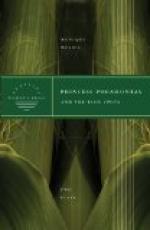“I did not fear it,” said Pocahontas, “but I thought it would never end. Had I been alone, though, without my husband and my child”—then, not knowing that court etiquette did not sanction the changing the subject of conversation by any one but the sovereign, she asked: “And how many children hast thou?”
Queen Anne was pleased with her naturalness and told her of her son and daughter and of the wonderful Prince Henry whom she had lost.
While they sat talking about their children as quietly as two plain housewives, there was a commotion at the end of the hall. The pages seemed very excited and uncertain what they ought to do. However, they could not have prevented if they would, and into the hall, clad in his long mantle, moccasins and with his headdress of feathers, strode Uttamatomakkin. Pocahontas, looking up, saw that he was examining eagerly all the furnishings of the hall and then his gaze was bent upon the Queen.
“Is yon the squaw of the great white werowance?” he asked, “and is this their ceremonial lodge? I have already beheld the King and he is a weak little creature whom any child at Werowocomoco could knock down.”
“Who is he, and what doth he say?” asked the Queen, who was delighted at his strange appearance.
“It is one of my people, Madame, and he wishes to know if thou art indeed the Queen that he may tell of thee when he returneth to Wingandacoa.” She did not think it wise to repeat the rest of his remarks.
The Queen, whose curiosity was great in regard to this strange race from overseas of whom she had heard so many tales, beckoned to Uttamatomakkin to come closer. The Indian walked stolidly to the dais where she stood.
“What is this mantle made of?” asked the sovereign, taking up an end of the painted and embroidered deerskin robe and rubbing it critically between her fingers.
Uttamatomakkin, thinking this was the English form of salutation and not intending to be outdone in politeness, caught hold of Queen Anne’s velvet skirt, and to the accompaniment of little shrieks of dismay from the ladies-in-waiting, fingered it in the same manner.
“That must thou not do,” remonstrated Pocahontas, trying not to laugh; but Uttamatomakkin grunted:
“Why should I not do what a squaw doth?”
The Queen recovered her equanimity and in sign of her good will unfastened a golden brooch and pinned it on the Indian’s broad shoulder. Then the chief broke off from his girdle a string of wampum, and before any one realized what he intended doing, he had fastened it to a pearl pin on the Queen’s bodice.
“I see I cannot get the better of him. Lady Rebecca,” laughed her Majesty; “but ask him what he doth with yon long stick.”
The pages, whose interest in this savage overcame for the moment their habit of etiquette, had approached little by little towards the end of the hall where he stood. They watched eagerly and with a certain dread of the unknown while he took from his pouch a white stick and his knife from his girdle. The stick, they saw, was covered with tiny nicks; and the Indian, looking from one person to another, made many more marks on the wand.




